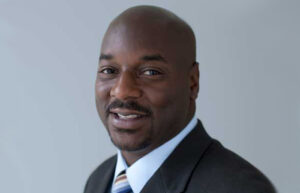Building Sustainable Small Businesses
View more stories from our 2020 Annual Report
Desmond Hudson has been with Reinvestment Fund for 21 years. During that time, he has worked in multiple roles but mainly as a Credit Analyst and Senior Portfolio Manager, honing his skills in analyzing financial information. Outside of his work at Reinvestment Fund, Mr. Hudson is also a tax expert.
 He has worked with the Campaign for Working Families (CWF) for two decades to help individuals, sole proprietors and single member LLCs achieve economic empowerment. He is also an Enrolled Agent and through CWF, has trained over 1,000 volunteers to prepare taxes for low-to-moderate income individuals under Volunteer Income Tax Assistance (VITA), a free tax service program administered by the IRS. Mr. Hudson also runs his own tax business, supporting financial literacy for over 300 clients.
He has worked with the Campaign for Working Families (CWF) for two decades to help individuals, sole proprietors and single member LLCs achieve economic empowerment. He is also an Enrolled Agent and through CWF, has trained over 1,000 volunteers to prepare taxes for low-to-moderate income individuals under Volunteer Income Tax Assistance (VITA), a free tax service program administered by the IRS. Mr. Hudson also runs his own tax business, supporting financial literacy for over 300 clients.
Little did Mr. Hudson realize that last spring, as small businesses were struggling to navigate the economic impact of pandemic-fueled closures, he would find a new role at Reinvestment Fund–one that aligned all the skills and expertise he had developed over the years.
It started with an “all-hands-on-deck” call to Reinvestment Fund staff to help small businesses access critical funds through the Paycheck Protection Program. As PPP funds were limited, time was of the essence for small businesses to pull together the information needed to apply.
Mr. Hudson worked on Reinvestment Fund’s PPP team, using the skills he had developed at Reinvestment Fund as well as through his work with VITA and his own tax-consulting business. His work revealed that many small businesses faced critical gaps in their business practices that were costing them earnings and endangering their long-term sustainability.
“We realized that if we want to help this sector – the children, the parents and the caregivers – providing business specific training and support would be essential.”
— DESMOND HUDSON, DIRECTOR, CLIENT ENGAGEMENT & TECHNICAL ASSISTANCE AT REINVESTMENT FUND
The challenges were particularly clear as Mr. Hudson helped early childhood education providers, many of whom had to hire either a tax professional or financial consultant to be able to apply with the right and accurate information. “We realized that if we want to help this sector – the children, the parents and the caregivers – providing business specific training and support would be essential,” shared Mr. Hudson.
To build on its ongoing early childhood education supports, Reinvestment Fund made a commitment to provide technical assistance around building sustainable businesses. Mr. Hudson leads this work in his new role as Reinvestment Fund’s Director of Client Engagement and Technical Assistance.
Mr. Hudson manages the delivery of technical assistance through several programs currently aimed at supporting early childhood education businesses. This includes the Fiscal Hub and Coaching to Success, programs aimed at helping providers achieve financial stability and sustainability.
“I discovered that many childcare providers got into the business to help a neighbor or a friend,” shared Mr. Hudson. “It was not about starting a new business and as a result, many providers don’t have systems in place to analyze their income and expenses so they can maximize their profits. This practice hinders their income potential and could also affect the quality of care.”
This challenge has been particularly devastating as providers faced lower enrollment and increased expenses stemming from the pandemic. A survey of almost 400 providers by Reinvestment Fund last fall revealed that 97% of those surveyed lost income over a five-month period with the onset of the crisis. About 23% of respondents said they had borrowed money on taken on debt and 85% had accessed grant funding to stay operational.
Under Mr. Hudson’s leadership, Reinvestment Fund is also launching a new pilot program called Train the Trainer funded by the William Penn Foundation to support the sector. The program will train both ECE providers and financial services professionals on how to prepare financials for early childhood education businesses with the expectation that increased financial literacy in this sector should allow providers to better plan for financial growth. After an 8-week training, the financial services professionals will be matched one-on-one with providers, to work together over 12 months.
“The providers will get the financial support that they need for free,” explains Mr. Hudson. “The trainers will earn a modest fee for their time, but more importantly, develop a new expertise and be part of a shared service network to help the early childhood education sector as a whole.
Ultimately, as Mr. Hudson sees it, it is the children who will benefit from the success of these small childcare businesses. “When a provider gains a better understanding of their finances, they have more freedom to invest in improvements to their program,” he explains. “They will be able to hire high quality staff, purchase additional equipment and supplies, offer more outdoor experiences and field trips, and serve more nutritious food – all of these enhance the learning and growth experience of the child.”